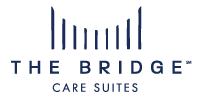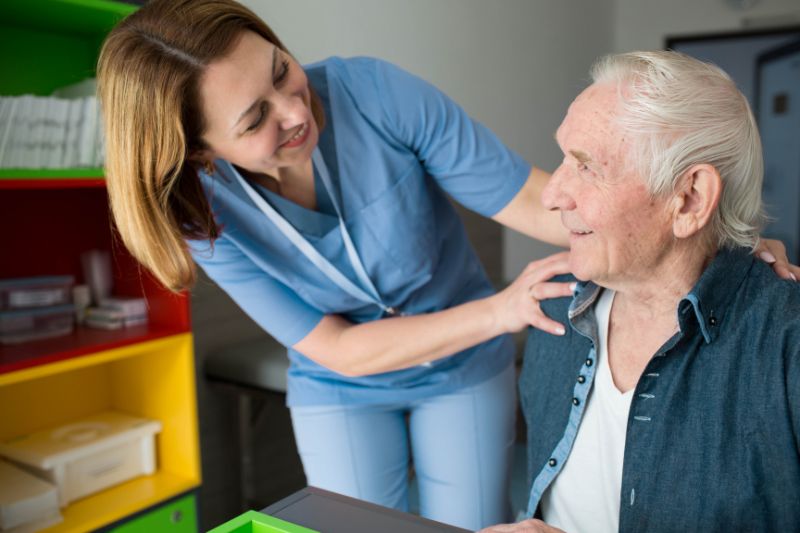A stroke patient’s recovery is all about support, whether through family, friends, care providers, and the broader community.
Family members of a stroke survivor and professionals charged with their care also need support to provide it successfully. And that’s what we’re here for — to be the resource you need for these types of situations. Our goal at The Bridge Care Suites is to help patients through their rehab and help our broader community with our advice.
You could be providing discharge care from Memorial Medical or HSHS St. John’s Hospital. In which case, this blog will help you advise the family of stroke survivors on how to proceed once the patient is sent home. And, through this blog, the loved ones of discharged stroke patients will have helpful home-living guidelines after the end of a hospital stay. Read on as this blog delves into suggestions that will vastly improve a stroke survivor’s quality of life once they return home:
Be Diligent – but Empathetic – About Rehab Exercises
Motor impairments are a common symptom for stroke survivors. Once the patient arrives home, they’ll need to focus on improving those functions. Care providers need to emphasize the importance of these exercises to a stroke patient’s family members. And a stroke survivor’s family members need to be proactive in learning about these exercises and being encouraging. Doing so will help rewire the brain, as frequent movement helps most with related symptoms. Of course, don’t be too forceful. Empathy and patience are 100% crucial in this process. All reinforcement should be positive.

Emphasize Independence. But Be Prepared to Help.
Stroke patients need to do things on their own if they’re going to make any progress in their recovery. Family members and loved ones can’t be too overbearing during at-home recovery because it’ll get in the way of improvements. Of course, be on standby to give love, support, and assistance when need be. At the end of the day, there’ll be things someone in stroke recovery can’t do, and they will need help. Just not too much of it.
Rely on Experts for Advice
Care providers will always benefit from checking with other authorities on these matters to advise patients’ families before at-home recovery. More than that, family members of stroke survivors would benefit from discussing how they can care for their loved ones with industry professionals. In some instances, this might mean talking with social workers or case managers. However, you could also look into a short-term rehab facility with skilled nurses (like The Bridge Care Suites). These healthcare professionals can provide further, multifaceted care before a permanent return home. Talking to people with expertise in the field will shed light on available insurance options and home modifications, for instance.
Monitor Medication Side Effects
Multiple prescribed medications are part and parcel of any stroke patient’s recovery regimen. From blood thinners to cholesterol control, each pharmaceutical serves its own purpose. Unsurprisingly, this roster of medications leads to side effects that must be monitored with a close eye. Logging a stroke survivor’s behaviors and symptoms caused by each prescription will help suss out any potential issues.
Keep a Keen Eye on Additional Stroke Side Effects
Generally, after a discharge from a hospital, family members’ and care providers’ attentiveness should be enough to offset a stroke survivor’s side effects. However, other side effects can develop several months after a stroke patient is discharged. Be vigilant about noticing anything unusual in your loved one’s behavior. If you’ve picked up on anything off-kilter, reach out to a healthcare professional ASAP. The fact that you’ve stayed on top of potential side effects will solve potential problems before they can escalate.
Don’t Get Deterred By Slowed Progress.
Using all the tips provided in this blog should make for steady, continual improvements once a stroke survivor returns home. But remember that stroke recovery isn’t a linear process, where everything falls into place on a specific schedule. It’s possible for patients to take several steps forward then hit a hurdle that sends them backward. As long as the overall pattern is recovery-forward, don’t worry about minor setbacks. It’s part of the process.
Verify all Potential Supplements with a Medical Professional.
There are supplements out there, not necessarily provided by medical professionals, that you might want the stroke survivor in your life to take. Not all of them will be detrimental, but note that some of these products – such as ginkgo Biloba – can increase the risk of a second stroke. No matter the supplement, reach out to a physician or other healthcare expert to see if it’s safe. They’ll lead you down the correct path.
Prepare to Overcome the 3-Month Plateau.
The likeliest scenario for any stroke survivor is to hit a 3-month plateau. While this leads to a slowdown in recovery, it doesn’t mean family members should stop pushing forward or that care providers should suggest backing off. At this 3-month point, neurological changes begin to stabilize. But improvements in functionality can keep happening for the rest of the stroke survivor’s life, of which there’s still plenty to live. In fact, the brain can continue healing for multiple decades after a stroke.
As such, recovery slowdowns are nothing to worry about. Keep on smiling and working for continued improvements, even if they aren’t coming a mile per minute.

Focus on Emotional Availability
The pseudobulbar effect causes sudden outbursts of laughter or crying in stroke survivors. These are just a couple of the emotional changes a patient can experience.
There’s also commonly anxiety, depression, and grief – all of these being natural reactions after a stroke.
Care providers should let family members know about this and discuss patience and support for these emotional twists and turns. And family members should be emotionally available, no matter the turbulence of the stroke survivor’s moods.
Understand the Risks of Falls
Stroke patients commonly struggle to get up off the floor. As such, falls are exceptionally dangerous and require heightened levels of attention.
When a fall happens, you need to look into altering your home modifications. Non-slip mats are a great place to start. And be sure that your loved one is capable of getting up on their own before you start leaving them alone.
Lastly, note that a brief stay at The Bridge Care Suites could help the stroke patient feel more comfortable and streamline their recovery. We want to be here for you and your loved one in whatever way possible.






